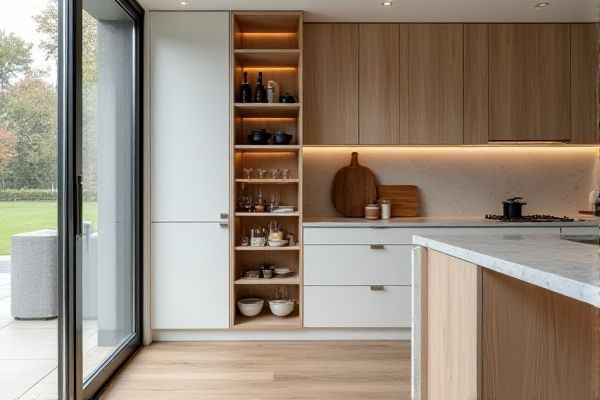
An in-wall pantry is recessed into the wall, saving space and providing a streamlined look, while a wall-mounted pantry attaches externally, offering flexibility in placement without permanent installation. Explore the rest of this article to discover which pantry option best suits Your kitchen needs and design preferences.
Table of Comparison
| Feature | In-Wall Pantry | Wall-Mounted Pantry |
|---|---|---|
| Installation | Built into the wall cavity during construction or remodeling | Mounted on the wall surface; requires wall anchors or studs |
| Space Efficiency | Maximizes kitchen space by utilizing wall depth | Occupies wall surface, reduces available wall space |
| Storage Capacity | Typically larger, deeper storage | Generally smaller, shallower shelves |
| Installation Complexity | Complex; may require professional carpentry and wall modification | Simple; can be DIY with proper tools |
| Cost | Higher due to construction and customization | Lower; pre-made units available |
| Aesthetic | Seamless, integrated look | Exposed, can be decorative or functional |
| Flexibility | Permanent; difficult to relocate | Portable; can be repositioned or removed |
Introduction to Pantry Storage Solutions
In-wall pantries provide seamless integration within the kitchen layout, maximizing space by utilizing existing wall cavities for discreet storage. Wall-mounted pantries offer flexible placement options, enhancing accessibility without permanent structural changes. Both solutions improve kitchen organization by tailoring storage capacity to user needs and available space.
Overview of In-Wall Pantries
In-wall pantries provide built-in storage solutions integrated directly into the wall cavity, maximizing space efficiency in kitchens without protruding into the living area. These pantries offer customizable shelving options that blend seamlessly with existing cabinetry, creating a sleek and cohesive look. Compared to wall-mounted pantries, in-wall designs allow for greater storage capacity while maintaining a minimalist aesthetic.
Key Features of Wall-Mounted Pantries
Wall-mounted pantries offer space-saving storage solutions by attaching directly to your kitchen wall, maximizing vertical space without consuming floor area. Key features include adjustable shelving for customizable storage, easy accessibility at eye level, and a sleek, modern design that complements various kitchen styles. This type of pantry is ideal for kitchens with limited space, allowing you to keep essentials organized while maintaining a clutter-free environment.
Space Optimization: In-Wall vs Wall-Mounted
In-wall pantries maximize space by utilizing wall cavities, creating a seamless storage solution that doesn't protrude into your kitchen area, ideal for small or narrow spaces. Wall-mounted pantries offer flexible placement and easier installation but take up wall space and may reduce available room for other kitchen activities. Your choice depends on whether you prioritize integrated, space-saving design or adjustable, accessible storage options.
Installation Requirements and Complexity
In-wall pantries require precise wall modifications, including stud removal and drywall repairs, making installation more complex and often needing professional expertise. Wall-mounted pantries install directly onto existing walls without major structural changes, offering a simpler, DIY-friendly setup. Your choice depends on available space and your comfort level with construction tasks.
Design Aesthetics and Customization Options
In-wall pantries offer a sleek, integrated design that seamlessly blends with existing cabinetry, maximizing space while maintaining a minimalist aesthetic. Wall-mounted pantries provide more flexibility in customization, allowing for varied sizes, finishes, and modular configurations that can be adjusted to suit specific kitchen styles and storage needs. Both options enhance kitchen organization, but in-wall pantries emphasize built-in elegance, whereas wall-mounted units prioritize adaptability and personalized design.
Accessibility and User Convenience
An in-wall pantry offers seamless integration into kitchen walls, maximizing space efficiency and providing easy access to stored items without protruding into the room. Wall-mounted pantries, while saving floor space, can limit access due to height constraints and may require reaching or step stools for upper shelves. User convenience favors in-wall pantries for quick, ergonomic access, especially in smaller kitchens where every inch counts.
Durability and Maintenance Considerations
In-wall pantries offer enhanced durability due to their integration within the structural framework, reducing exposure to external damage and wear. Wall-mounted pantries, while easier to install and relocate, often require more frequent maintenance to address potential issues like wall damage or weight strain. Choosing between these options depends on balancing long-term sturdiness with flexibility and upkeep preferences.
Cost Comparison: In-Wall vs Wall-Mounted
In-wall pantries typically involve higher installation costs due to the need for wall modification and professional labor, averaging $1,500 to $3,000 depending on wall structure and materials. Wall-mounted pantries offer a more budget-friendly option, usually priced between $200 and $800 with easy DIY installation, making them suitable for renters or those with limited renovation budgets. Your choice influences both initial investment and long-term value based on space optimization and home improvement goals.
Choosing the Best Pantry for Your Home
Choosing the best pantry for your home depends on space, accessibility, and design preferences. In-wall pantries maximize kitchen space by integrating storage within the wall cavity, offering a streamlined, concealed solution ideal for smaller kitchens. Wall-mounted pantries provide flexible installation options, allowing for customizable height and location, making them perfect for homeowners seeking easy access and stylish open storage.
 homyna.com
homyna.com